We at educations.com, believe in the immeasurable value of studying abroad. However, we also recognize that the COVID-19 pandemic will impact many students during their research phase of international higher education opportunities.
Based on survey findings, this report can help both students and higher education institutions understand how opinions, attitudes, and new realities are currently shaping international education.
We’ve collected over 2,700 responses from prospective and current international students from a survey we ran between October 1st and October 18th, 2020. In this follow-up report, we compare the findings from the October survey to a previous survey conducted around six months ago between March 16th and April 22th, 2020. Our intention is to observe how students’ perceptions and opinions have changed and developed. You can read the report based on the March/April survey here.
Please note that this report focuses on responses from prospective students only and not current students. The statistics used in this report will be based on responses from prospective students in both the October and March/April surveys unless otherwise stated.
Headline findings:
-
Desire to study remains strong but uncertainty creeps up. 78% of prospective students surveyed in October plan to begin studying in the next two years, indicating a strong desire to study despite the coronavirus pandemic. However, the proportion of students who answer “I don’t know yet” has increased to 15% in October from 10% in March/April, highlighting increasing uncertainty about study plans.
-
Minimal intention to cancel study plans. In the October survey, only a minute percentage of prospective students (3.9%) plan to cancel their future study plans in response to the COVID-19 outbreak. Nevertheless, students are considering alternative options such as postponing their studies (39%) and studying in a different country (14%).
-
Those postponing studies have an eye on future career/studies plans. Prospective students who are postponing their studies intend to do things that would be beneficial for their financial situation and/or future career or studies plans: work (59%), study some courses (49%), take an internship (23%), or volunteer (21%).
-
Strong preference for on-campus study, tempered by dynamic COVID-19 developments. A staggering proportion of prospective students (53% in October) still expect to be traveling abroad to study on campus. This shows how despite the current situation, many prospective students are determined to experience the full study abroad experience. Interestingly, the percentage of prospective students who are willing to start their studies online but move to on-campus study at a later date has increased to 23% in October from 16% in March/April. This may reflect students’ acceptance of the fluidity of the situation where universities may have to move their studies online.
-
Interest in studying online increases slightly. More than half of prospective students are not interested in studying online. However, there is a slight increase in the proportion of prospective students who are very or extremely interested in studying online — 22.5% in October vs. 20.3% in March/April.
-
Willingness to study online reflects COVID-19 realities. Around a third (33.1%) of prospective students are willing to study online until COVID-19 restrictions are eased — indicating their acceptance that COVID-19 restrictions are likely to be part of their study-abroad experience.
-
Top concerns about online studies remain unchanged. These include “lack of social interaction with classmates” and “staying focused and self-motivated”.
The geographic breakdown of the prospective students in the October 2020 survey is as follows:
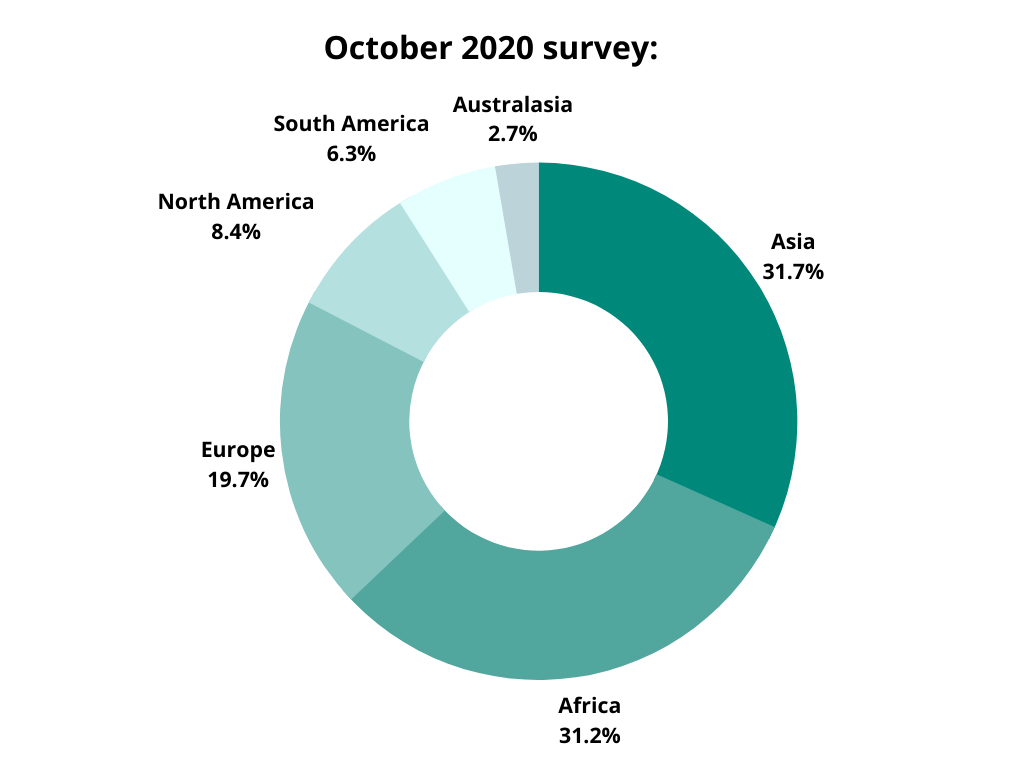
Finding #1. Desire to study remains strong but uncertainty creeps up
To get an idea on whether there is a relationship between COVID-19 and when students plan to begin their studies, we have analyzed how far into the future prospective students intend to begin their studies.
Our hypothesis is that, due to COVID-19, a majority of students would consider delaying their study plans significantly. However, 78% of prospective students surveyed in October plan to begin studying in the next two years. This is similar to the 75% of prospective students surveyed in March/April who intend to begin studying in the next two years. This indicates that the desire to study is still strong despite the coronavirus pandemic.
However, the proportion of students who answer “I don’t know yet” has crept up to 15% in October from 10% in March/April. This highlights that prospective students are increasingly uncertain about their immediate study plans due to continuing COVID-19 developments.
Q: When do you plan to start your studies?
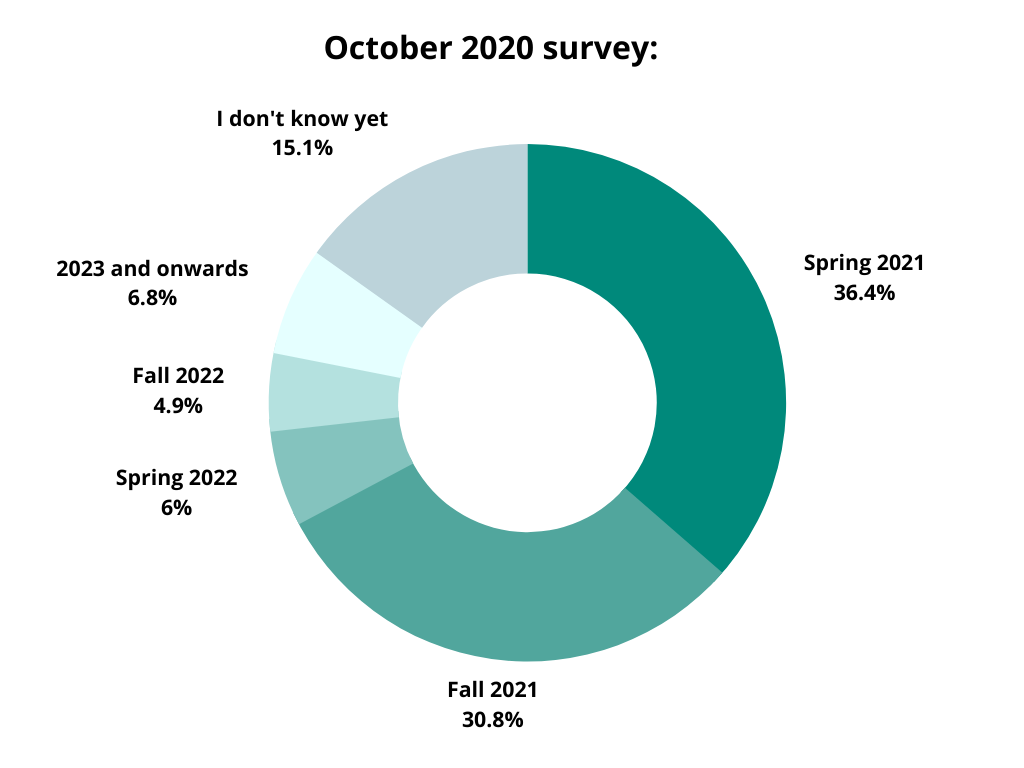
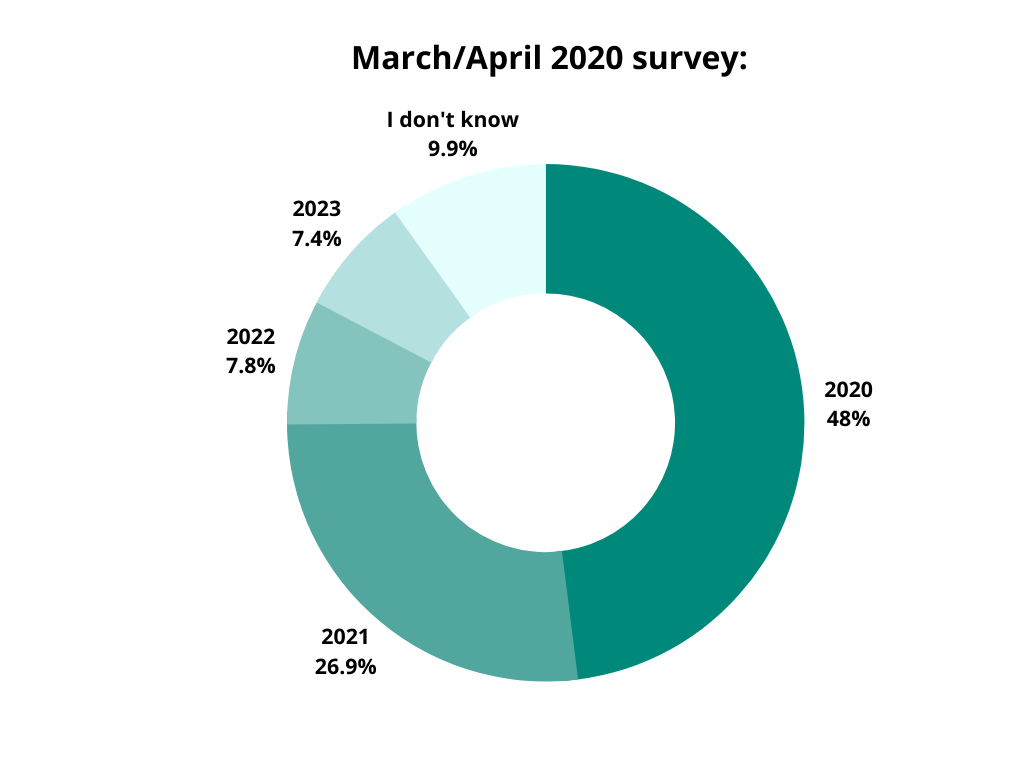
Finding #2. Minimal intention to cancel study plans
In the October survey, only a minute percentage of prospective students (3.9%) plan to cancel their future study plans in response to the COVID-19 pandemic. This is similar to the very low proportion (5.4%) of prospective students in the March/April survey who intend to cancel their study plans.
This demonstrates that while students are feeling increased uncertainty, they are not canceling their plans immediately. Students dedicate time and resources to their international studies, and are committed to seeing their plans through.
While students are not on the whole canceling their study plans, they are considering alternative options due to the pandemic. These options include postponing their studies and studying in a different country.
A substantial 39% of prospective students in the October survey plan to postpone their study abroad plans. This proportion is slightly lower than the 42% of prospective students surveyed in March/April. Additionally, 14% of prospective students indicate in the October survey that they plan to study in a different country.
“I really want to study abroad but this pandemic has got me worried and confused and it has caused a delay in achieving my career goals.”
- Respondent’s quote
Q: What are your study abroad plans now in light of COVID-19?
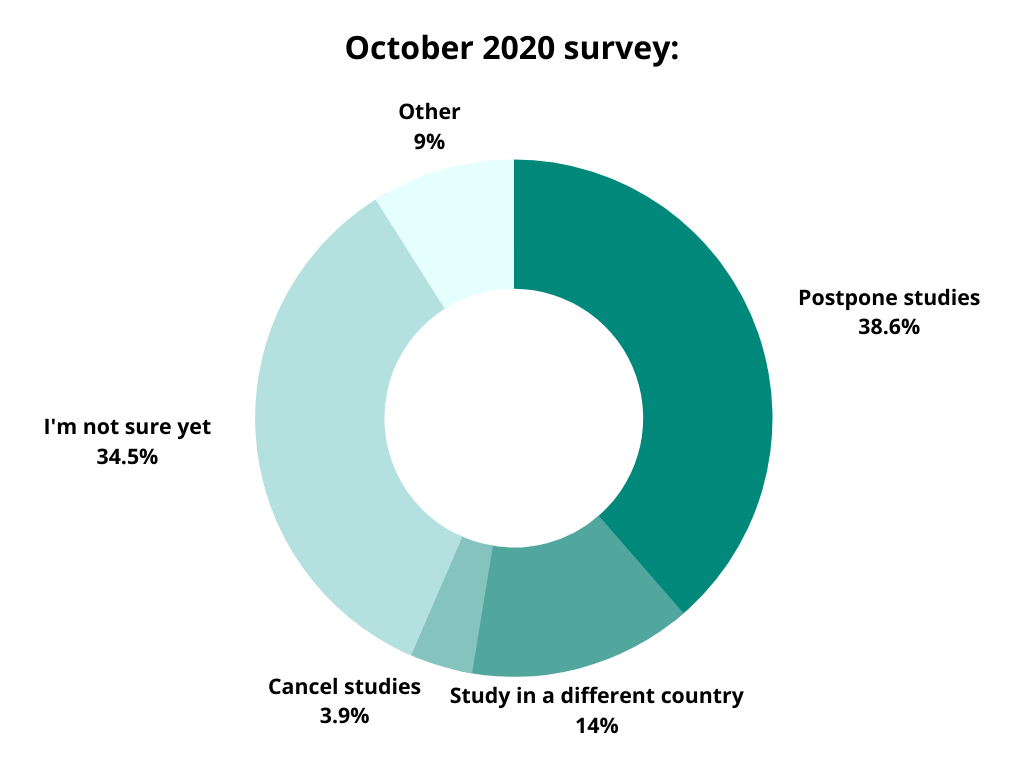
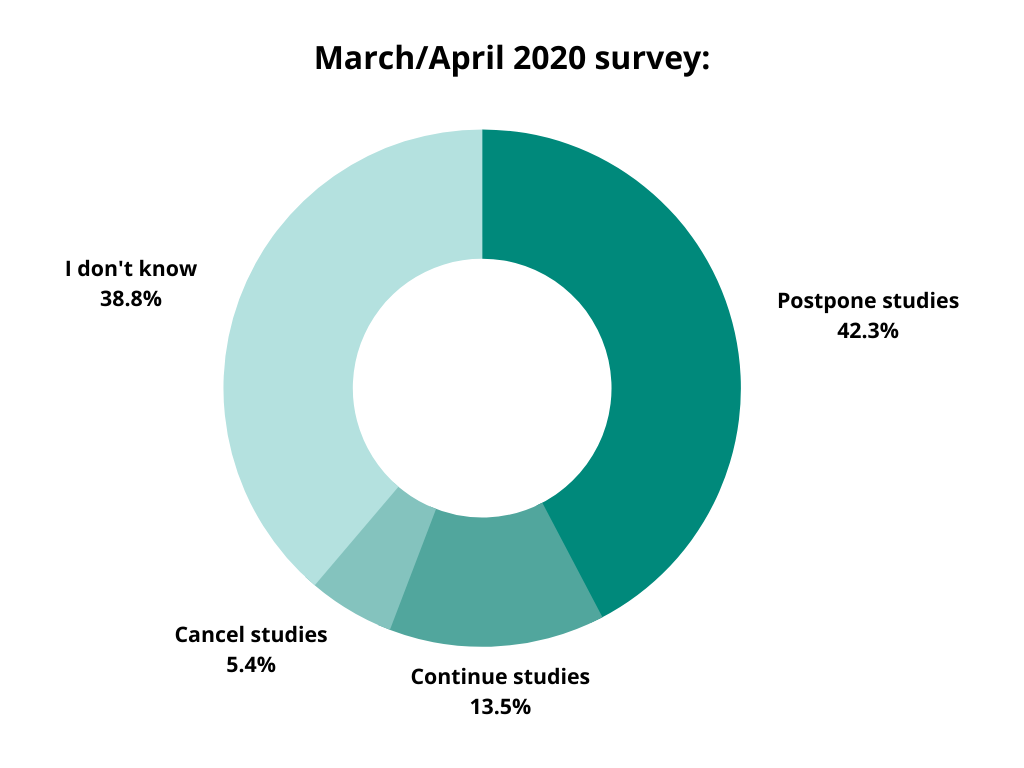
Finding #3. Those postponing studies have an eye on future career/studies plans
For those who intend to postpone their studies, the most popular options of what they intend to do instead are work (59%) and study some courses (49%). Taking an internship (23%) and doing voluntary work (21%) are also some popular alternatives. This highlights that prospective students who are postponing their studies intend to keep active and productive. Many of them are looking to do things that would be beneficial for their financial situation (work, internship) and/or future career or studies plans (study some courses, take an internship, volunteer).
“I just started a German course online to make it easier for me when I go to Germany.”
- Respondent’s quote
“Study locally first and then apply to study abroad later on after the Covid-19 situation cools off.”
- Respondent’s quote
Q: Since you want to postpone your studies abroad, what are you planning to do instead? (Select all that apply)
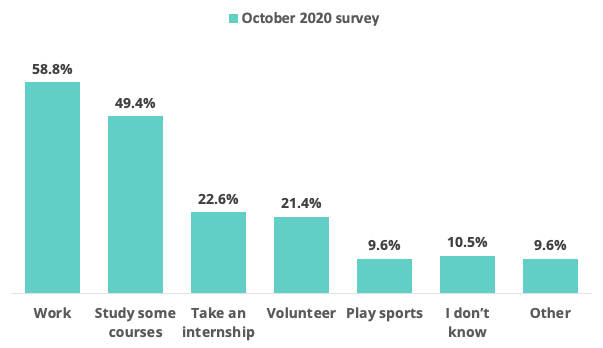
Finding #4. Strong preference for on-campus study, tempered by dynamic COVID-19 developments
More than half of prospective students in both the October (53%) and March/April (55%) surveys still expect to be traveling abroad to study on campus. This is a staggering proportion in light of global COVID-19 developments and it shows how despite the current situation, many prospective students are determined to engage with the full study abroad experience. This is supported by the very low percentage of students (3% in October and 5% in March/April) who are considering doing their entire degree online.
Interestingly, the percentage of prospective students who are planning or willing to start their studies online but move to on-campus study at a later date has increased to 23% in October from 16% in March/April. This may reflect prospective students’ increasing acceptance of the fluidity of the situation where universities may have moved or may move their studies online depending on the coronavirus developments in their country or region.
Q: Which of the following are you currently considering?

Finding #5. Interest in studying online increases slightly
Prospective students prefer not to study online, but there has been a slight increase in interest in studying online in October compared to March/April.
Over half of prospective students are not so interested or not at all interested in studying online. The percentage in October (51.4%) is slightly lower than that in March/April (55.3%).
On the opposite end of the scale, there is a slight increase in the percentage of prospective students who are either very or extremely interested in studying online — 22.5% in October vs. 20.3% in March/April.
“I think online classes would be great but knowing myself I get distracted easily so I think face-to-face interaction would be better for me.”
- Respondent’s quote
Q: How interested would you be in studying your degree online because of COVID-19?
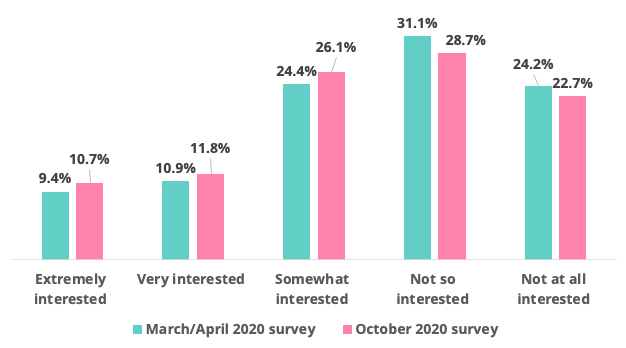
Finding #6. Willingness to study online reflects COVID-19 realities
Around a third (33.1%) of prospective students surveyed in October are willing to study online until COVID-19 restrictions are eased. This reflects that a substantial number of prospective students accept that COVID-19 restrictions are likely to be part of their study-abroad experience.
Meanwhile, nearly a third of prospective students (29%) choose some timeline in which they are prepared to study online, that is, a semester, an academic year or most of their qualification. This indicates that the uncertainty generated by COVID-19 developments means that many students feel that they have no choice but to wait and see what happens.
Nevertheless, a considerable proportion of prospective students (28%) remain resistant to the idea of studying online.
Q: For how long would you be prepared to study online if you were to move to on-campus study at a later date?
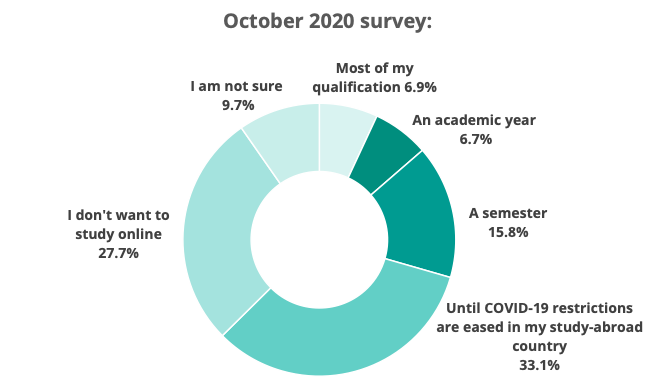
Finding #7. Top concerns about online studies remain unchanged
Prospective students’ top 5 concerns about online studies remain unchanged from March/April to October. You can read the analysis on the demand for online studies based on the March/April survey here.
Prospective students' top 5 concerns are:
-
Lack of social interaction with classmates
-
Staying focused and self-motivated
-
Internet/wi-fi speed or availability
-
Understanding the material in online delivery format
-
Lack of recognition of the completed qualification
“Not fun! I won't get the full experience of being in uni. And I am not paying 19,000 pounds for online classes. That's a waste of money.”
- Respondent’s quote
“My mental health would be affected and I don’t want to stay inside my house. I want to study abroad to explore.”
- Respondent’s quote
“Constant electricity blackouts and other situations specific to my country that a teacher abroad might not understand.”
- Respondent’s quote
In these unprecedented times, universities and students should be commended for their efforts and flexibility to move from in-person to online learning where necessary. Universities can take into account feedback and responses from students to help them overcome some of the barriers to online studies. For instance, universities can reach out and offer counseling and study support to students who are having trouble focusing and staying motivated, or are struggling with their mental health.
Q: What are your main concerns with online studies?
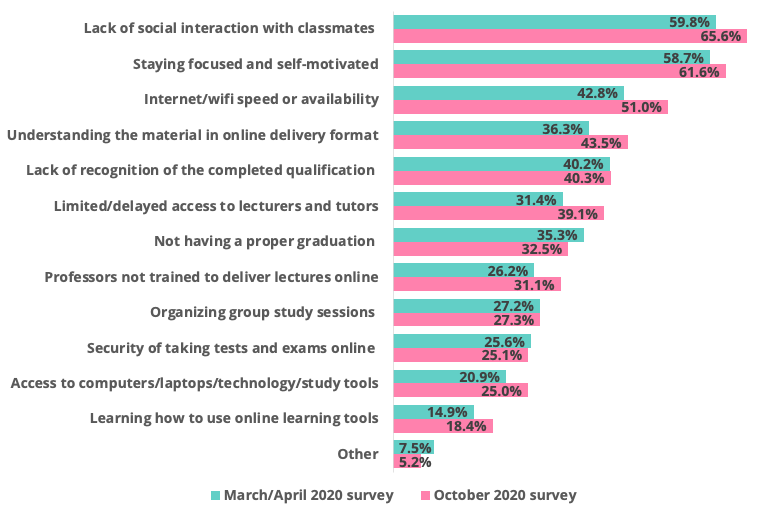
Final thoughts
The uncertainty felt by a large part of the world due to COVID-19 is reflected in the opinions and decisions made by prospective students in relation to their study abroad plans. The consideration of alternative options such as online studies and the postponement of study abroad plans speak to students' determination to accomplish their international education goals while being mindful of the realities and restrictions caused by the coronavirus pandemic.
While students have to adjust their plans and expectations, universities are also having to change how they deliver the study experience and adapt to the fluidity caused by COVID-19 developments. These can be stressful times for both current and prospective students.
A student tells us that:
“I wish educators would not be so hard on students. Covid took a lot from us, materialistically and emotionally. We're all trying to heal and stress from school isn't helping.”
It is therefore important for universities and higher education institutions to reach out to students to see how they can help students overcome some of the barriers to their study goals. It is encouraging to see both students and universities doing what they can to adapt to the situation and help one another get through the pandemic safely.
Studying abroad remains a dream goal for many international students. Although COVID-19 has complicated the question of when and how they'll make it happen, many students remain hopeful and determined to achieve their study goals. As one student writes:
“I just hope we can all find ways to overcome these times, and continue with our day-to-day lives. I would love to study abroad and experience other cultures and lifestyles.”
Want to find out how your target international students feel and think about studying abroad? Download our 2020 Student Insights data to learn how student priorities and concerns differ by level of study and nationality.






%20-%202.png)

